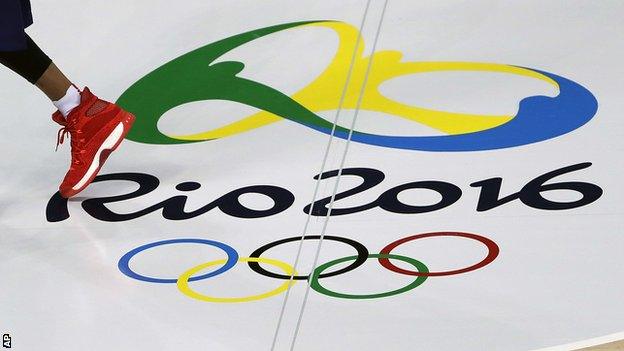Rio 2016: Wada publishes report highlighting 'serious failings' at Olympic Games
- Published

The Wada report said that, on some days, "up to 50%" of planned tests had to be aborted
A Wada report on the anti-doping methods employed at Rio 2016 has highlighted "serious failings".
The World Anti-Doping Agency said many athletes who had been targeted for testing "simply could not be found".
It added that, on some days, "up to 50% of tests were aborted".
Its 55-page Independent Observers report, external found that, of the 11,470 athletes, 4,125 had no record of any testing in 2016, of whom 1,913 were competing in 10 "higher-risk sports".
It also said:
nearly 100 samples were not matched to an athlete because of data entry errors
one missing sample was not located until two weeks after the Games
there was little or no in-competition blood testing in many high-risk sports and disciplines, including weightlifting
there was no out-of-competition testing conducted in football, which Wada found "surprising"
there were almost 500 fewer tests conducted than organisers had planned during the Games
without the dedication of doping-control staff, "the anti-doping program would have almost certainly collapsed"
as of 8 August, only 4,795 athletes were providing whereabouts information in the anti-doping system
The International Olympic Committee (IOC) is ultimately responsible for delivering the anti-doping programme for the Olympic Games.
Wada mentioned several "failings" which led to inadequate support for the chaperones employed to notify athletes of testing.
It said that on several occasions more than half of these failed to turn up, or turned up very late. It said they were "disincentivised" because of a lack of training, poor travel arrangements, and the fact many could not speak English.
It said that, for "the majority of times" the 'no-notice' nature of testing was "obviously compromised" because chaperones did not know where athletes were and had to ask their team-mates where they were.
In one of its recommendations, it said: "Untrained and inexperienced chaperones should not be working at the Games.
"It undermines respect and trust among athletes in the anti-doping program, and provides opportunities for experienced and unscrupulous athletes who would want to abuse the system to manipulate the doping control process."
Wada did praise improvements made to Rio's anti-doping laboratory, however.
The organisation had suspended the lab just six weeks before the Games opened, because it failed to comply with international standards.
But Wada said it had been "superbly equipped", and was "operated very securely and generally very efficiently".
It said it now represents an "outstanding legacy from the Games for the anti-doping movement in South America".
Integrity of doping process 'not undermined'
A statement on the IOC's website quoted Dr Richard Budgett, the IOC's medical and scientific director, saying the report "shows that it was a successful Olympic Games with a successful anti-doping programme".
He added that the integrity of the programme had been "ensured despite some challenges".
Speaking to BBC Radio 5 live, Sir Craig Reedie, president of Wada, said that the logistical problems highlighted were disappointing.
"What was a real problem was the sample collection," he said, "and there were number of major issues in Brazil, one was the lack of money and the other lack of manpower and some of that worked its way through to the sample collection process.
"In general the integrity of the process was not undermined according to the report."
Reedie said the doping programme had been well planned but let down by unforeseen circumstances.
"If you assume that you have a certain number of people to do the work and 50% don't turn up you've got a problem," he said.
Analysis
BBC sports editor Dan Roan
In the midst of the Russian doping scandal, and the revelation that both London 2012 and Sochi 2014 were sabotaged by state-sponsored cheating, it was crucial that the authorities did as much as possible to show they were keeping Rio 2016 clean.
Instead, this damning report is another shattering blow to the credibility of anti-doping and the Olympic movement's integrity, showing how organisational chaos blighted the Games' drugs-testing programme.
After it refused demands to ban Russia's entire team from the Olympics, do not be surprised if there are now calls for the IOC itself to be declared Wada non-compliant.
And there could also be tough questions for the UK Anti-Doping agency, which acted as the secretariat for a pre-Rio anti-doping taskforce.